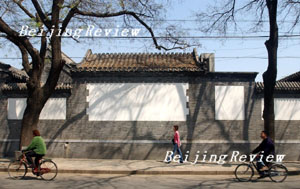
I want people to visit me in Beijing. I love showing friends from home my hutong neighborhood, and I hope one day to show off to my parents the Chinese I've learned (which sounds mighty impressive, if you know nothing).
If only the weather would cooperate.
Right now there's a seven-year drought in the north and a typhoon in the south. In Beijing we've just come through spring sandstorms and what is reportedly the worst pollution in six years, deemed "hazardous," as in, keep your windows closed and don't go outside unless you must.
Meteorologists in China are predicting a summer of terrible weather, hotter and stormier than usual, with persistent drought and floods, depending on the region.
Suffice to say, a fabulous climate isn't at the top of the list when it comes to reasons to visit China.
My grandfather got flat-out angry when he heard I was living here, in what might be the world's most polluted city, fearing for my health.
Despite all this, so far I've managed to convince two people to visit, though I fear their experiences might but an end to future visits.
One friend came in the winter and the first few days of her trip were sunny and blue-skied, making for some fabulous pictures set against the red walls of old Beijing landmarks. We were thrilled.
However, in the weeks that followed, the days were uniformly chilly and gray. Coming from Canada, we have no problem with cold. But when each day is colorless and hazy, it gets depressing.
The forecast is no help. A "blue sky" day means the particulate matter in the air is below a set level, but not necessarily that the sky is blue—in fact, most often it isn't.
The other day I saw one forecast on CNN that described the weather in Beijing as "smoky."
Meanwhile, Chinese meteorologists are considering the addition of a "dust forecast" because of public demand.
The next friend to visit, a Canadian living in Hong Kong, came this spring, happy to escape the suffocating humidity that had caused mold to sprout on her walls and mattress.
Instead she got a sore throat. We went sightseeing her first day, making the mistake of walking outdoors in disturbingly polluted air on the cusp of sandstorm season.
My friend's sore throat and my aching chest were relentless for the entire weekend visit, as was the pollution, putting a real downer on touring the capital.
But there are far more serious repercussions than the effect on tourists when it comes to the weather in China.
The drought is threatening drinking water supplies and hot weather forecast for this summer will strain the electricity grid, while floods this spring have already destroyed thousands of homes and affected about 4.5 million people.
According to government statistics, last year the death toll from natural disasters was almost 2,500.
Against this background of turbulent weather, in some ways mimicking the chaotic development of this country—and in part caused by the environmental degradation that has resulted from it—the government is playing rainmaker.
The first time someone told me that the Chinese Government makes it rain, I thought it was a joke. And then I heard the thunder. But not really.
"A total of 163 pieces of cigarette-like sticks containing silver iodide were burnt and seven rocket shells were launched in six districts and counties, which resulted in the heaviest rainfall in Beijing this spring," the official Xinhua News Agency reported earlier this month, explaining the rumbling in the sky.
China is said to have spent hundreds of millions of dollars on cloud seeding in the last decade, a controversial practice that some say doesn't work.
Rain triggered in recent weeks was to wash the dust and grime from Beijing and to add moisture to the dry fields.
In the past, the government has manipulated the weather to make it rain in order to bring down the temperature, and this summer will likely be more of the same.
Sometimes I find it a little eerie. Last month I sat stuck in rush hour Beijing traffic in the middle of a dust storm, the sky yellow-hued while seasonal fluff from the trees blew around in the grit. I saw splatter on the taxi windshield; it was raining mud— according to media reports, the result of cloud seeding.
I was on my way to meet expat friends for supper. Two of them have lived in China for about five years, and the terrible weather in recent months is the last straw: They're leaving. Their interest in China isn't enough to keep them through the heat and cold and grayness and haze and dust.
Maybe one day I'll feel as they do, although I'm not there yet.
I'm still enraptured with this place, and looking forward to a planned visit by another friend from home. He's coming in July and I just hope the weather doesn't ruin his trip—or repel future guests.
Erin Conway-Smith is a Canadian living in Beijing.
| 